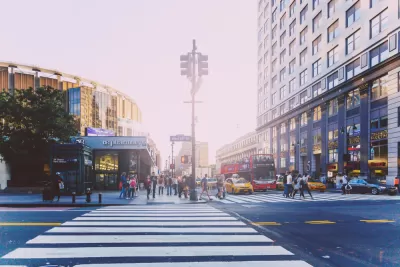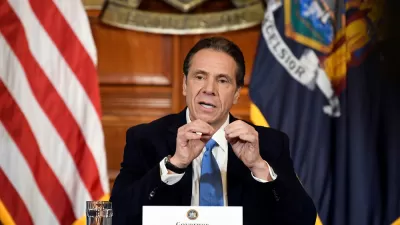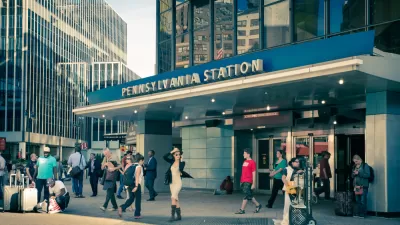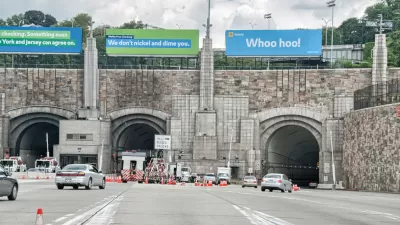New York Governor Kathy Hochul is backing one of the largest real estate development projects in U.S. history—larger even than the nearby Hudson Yards project.

New York Gov Kathy Hochul has signed off on a massive redevelopment plan for the area of Manhattan around Penn Station, according to a New York Times article by Matthew Haag and Patrick McGeehan.
The so-called Empire Station Complex would build ten towers of mostly offices around Penn Station, the busiest transit hub in the country. Haag and McGeehan describe the scope of the plan as follows:
Boosters of the Penn Station plan often frame the fixes at the station, which are estimated to cost $7 billion and be completed by 2027, as the project’s centerpiece. The plan would add taller ceilings and new entrances to the station but no additional tracks or platforms. But the plan’s most significant impact would be the new buildings, which are expected to take two decades to complete and require the demolition of numerous properties on several blocks, including a 150-year-old Roman Catholic church.
There project will make quite a neighborhood:
By 2044, when the last of the Penn Station redevelopment towers are slated to be finished, the project and Hudson Yards will very nearly form a contiguous corridor of gleaming glass and steel towers. Between 30th and 34th Streets, clusters of some of the tallest buildings in North America will stretch from Sixth Avenue near the Empire State Building to the eastern edge of the undeveloped train yards that border the West Side Highway. Together the two areas would represent over 30 million square feet of buildings, with the vast majority designed for office tenants.
Gov. Hochul is backing the plan in a time of deep uncertainty for the office market in Manhattan and other urban centers around the country, with many workers transitioning permanently to remote work or working hybrid schedules that have left many downtowns bereft of vitality and economic activity.
Former Governor Andrew Cuomo originally proposed the redevelopment project back at the beginning of 2021. Empire State Redevelopment voted unanimously to support the project in July 2021. Gov. Hochul's support for the project will be instrumental in wielding state power to override the local zoning code to allow developers to "build taller and larger than they otherwise could have," according to the article.
As noted in the article, however, the project is attracted fierce opposition. As an example: David Meyers reports in a separate article for the New York Post that opponents held a mock funeral for the buildings that will be razed to make way for the project last week across the street from Penn Station.
FULL STORY: Penn Station Plan Makes a High-Stakes Bet on the Future of Office Work

Maui's Vacation Rental Debate Turns Ugly
Verbal attacks, misinformation campaigns and fistfights plague a high-stakes debate to convert thousands of vacation rentals into long-term housing.

Planetizen Federal Action Tracker
A weekly monitor of how Trump’s orders and actions are impacting planners and planning in America.

In Urban Planning, AI Prompting Could be the New Design Thinking
Creativity has long been key to great urban design. What if we see AI as our new creative partner?

King County Supportive Housing Program Offers Hope for Unhoused Residents
The county is taking a ‘Housing First’ approach that prioritizes getting people into housing, then offering wraparound supportive services.

Researchers Use AI to Get Clearer Picture of US Housing
Analysts are using artificial intelligence to supercharge their research by allowing them to comb through data faster. Though these AI tools can be error prone, they save time and housing researchers are optimistic about the future.

Making Shared Micromobility More Inclusive
Cities and shared mobility system operators can do more to include people with disabilities in planning and operations, per a new report.
Urban Design for Planners 1: Software Tools
This six-course series explores essential urban design concepts using open source software and equips planners with the tools they need to participate fully in the urban design process.
Planning for Universal Design
Learn the tools for implementing Universal Design in planning regulations.
planning NEXT
Appalachian Highlands Housing Partners
Mpact (founded as Rail~Volution)
City of Camden Redevelopment Agency
City of Astoria
City of Portland
City of Laramie





























